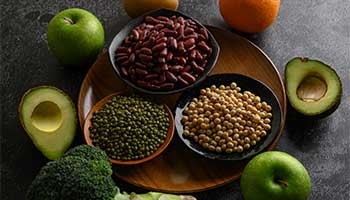Nourishing Choices: Unveiling the Top 60 Healthy Foods for a Vibrant Life

A healthy diet is the ultimate recipe for a vibrant life! Incorporating a wide variety of foods such as fruit, vegetables, nuts, seeds, and lean protein can help support your overall health. Eating foods that cover all different types of food groups like carbs, protein, healthy fats, fiber and different vitamins and minerals provides you multiple health benefits.
A healthy diet promotes overall well-being by supporting weight management, reducing the risk of chronic diseases, providing essential nutrients, improving energy levels, enhancing mood, and supporting optimal bodily functions.
Here is a list of the 60 best healthy foods.
1. Apples :
Apples contribute to better health by providing essential nutrients, fiber, and antioxidants. They support heart health, aid digestion, regulate blood sugar, and boost overall well-being with their natural goodness. (1)
2. Bananas :
Bananas enhance health with potassium for heart function, vitamins for immunity, and fiber for digestion. Their natural sugars provide energy, while antioxidants combat oxidative stress, promoting overall well-being.
3. Avocados :
Avocados enhance health by providing heart-healthy monounsaturated fats, fiber for digestion, and various vitamins and minerals. They support weight management, reduce inflammation, and contribute to overall well-being.
4. Berries :
Berries, rich in antioxidants, boost health by combating oxidative stress. They promote heart health, enhance cognitive function, regulate blood sugar, and support immune function, offering a delicious way to nourish the body. Berries are excellent healthy foods to eat everyday.
5. Oranges :
Oranges improve health with vitamin C for immune support, fiber for digestion, and antioxidants for overall well-being. They aid heart health, skin vitality, and may lower inflammation, contributing to a healthier lifestyle.
6. Kiwi :
Kiwis provides a wealth of nutrients, including vitamin K, vitamin C, folate, potassium, and vitamin E, along with fiber. These elements offer numerous health advantages, such as enhancing immunity, promoting cardiovascular well-being, and safeguarding eye health.
7. Coconut :
Coconuts enhance health by providing medium-chain triglycerides for energy, supporting heart health. Rich in electrolytes, they aid hydration. Antioxidants and lauric acid contribute to immune function, promoting overall well-being.
8. Lemons :
Lemons improve health by offering a high dose of vitamin C for immune support, aiding digestion with fiber, and promoting hydration. Their antioxidants contribute to skin health and overall well-being.
9. Grapes :
Grapes contain nutrients and antioxidants that reduce the risk of cancer, enhance cardiovascular well-being, reduce elevated blood pressure, and lower the likelihood of experiencing constipation.
10. Pomelo :
Pomelo, a nutritionally rich citrus fruit, is abundant in protein, fat, vitamin C, copper, potassium, and various nutrients. It facilitates weight loss, improves digestion, and supports cardiovascular well-being
11. Tomatoes :
Tomatoes are rich in fiber, vitamins (including vitamin C, folate, and vitamin K), and minerals like potassium. Additionally, they contain plant compounds such as lycopene, beta-carotene, chlorogenic acid, and naringenin, which provide protection against specific cancers. (2)
12. Cucumber :
Cucumbers contain numerous antioxidants, flavonoids, lignans, and triterpenes, along with vitamin A, vitamin C, magnesium, and manganese. These nutrients collectively promote heart, skin, bone, and digestive well-being. They are good food options to include as a salad with your lunch or dinner.
13. Carrots :
Carrots are good food for health. Carrots are widely consumed root vegetable, provide fiber, beta-carotene, potassium, and antioxidants. These components have demonstrated benefits in reducing cholesterol levels, enhancing eye health, and lowering the risk of cancer.
14. Cabbage :
Cabbage is rich in essential nutrients, including protein, fiber, vitamin K, vitamin C, folate, manganese, potassium, magnesium, and calcium. These contribute to better digestion, enhanced immune function, and heart health.
15. Broccoli :
Broccoli is a healthy food item that improves health by providing a wealth of nutrients, including vitamins C and K, fiber, and antioxidants. It supports bone health, aids digestion, boosts the immune system, and may reduce the risk of chronic diseases, contributing to overall well-being and vitality.
16. Bell Pepper :
Bell peppers offer abundant vitamins, antioxidants, and carotenoids, imparting numerous health advantages. These include reducing the likelihood of various chronic diseases and enhancing the health of the eyes.
17. Spinach :
Spinach is a nutritious addition to your daily diet, being a dark green leafy vegetable packed with a plethora of essential nutrients like protein, iron, magnesium, calcium, and various vitamins and minerals.
18. Mushrooms :
Mushrooms are a healthy eating option that contributes to health by offering a variety of nutrients, including vitamins, minerals, and antioxidants. They support immune function, provide anti-inflammatory benefits, regulate blood sugar, and contain compounds that may have anticancer properties, enhancing overall well-being and vitality.
19. Kale :
Kale, a cruciferous vegetable, abounds in vitamin A, vitamin C, vitamin K, calcium, copper, potassium, and manganese. This leafy green is abundant in antioxidants such as quercetin and kaempferol.
20. Onions :
Onions enhance health by providing antioxidants, particularly quercetin, which supports heart health and reduces inflammation. They contain vitamins C and B, fiber, and sulfur compounds that may have antimicrobial properties, contributing to immune support.
21. Beetroot :
Beetroot is a nutritious addition to your diet as it aids in reducing blood pressure, promotes digestion, and boosts athletic performance, making it beneficial for overall health and well-being.
22. Brussel Sprouts :
Brussels sprouts, abundant in nutrients and antioxidants, contribute to heart health, support balanced blood sugar levels, and have the potential to alleviate inflammation, making them beneficial for overall well-being.
23. Eggplant :
Eggplant enhances health with its low calorie and high fiber content. Rich in vitamins and minerals, it promotes digestion, aids weight management, and provides antioxidants for overall well-being.
24. Artichoke :
Artichokes are packed with essential nutrients including vitamin C, vitamin K, protein, vitamin B6, folate, iron, magnesium, and potassium. These elements collectively enhance heart health, regulate blood pressure, and support liver health.
25. Garlic :
Garlic, a flavorful and healthful inclusion in salads and savory cooked dishes, features allicin with antioxidant and antimicrobial properties. Its nutrient content may lower the risk of cancer and cardiovascular diseases. (3)
26. Peas :
Peas are recognized for their nutritional richness, contributing to digestive and cardiovascular health while reducing the likelihood of diabetes, making them a beneficial addition to your diet.
27. Potatoes :
Potatoes enhance health by providing essential nutrients such as vitamins C and B6, potassium, and fiber. They support overall well-being, aid digestion, and contribute to heart health when prepared healthily.
28. Red Cabbage :
Red cabbage is a nutrient-rich vegetable abundant in antioxidants, including anthocyanins, known for their capacity to reduce both harmful cholesterol levels and inflammation.
29. Collard Greens :
Collard greens provide significant amounts of vitamin A, vitamin C, and various nutrients that support heart health, enhance bone health, and contribute to cancer management.
30. Swiss Chard :
Swiss chard is rich in vital vitamins and minerals, including protein, vitamin A, vitamin C, vitamin K, magnesium, and manganese.
31. Eggs :
Eggs improve health by providing a high-quality protein source, essential amino acids, and nutrients like vitamin B12, choline, and selenium. They support muscle development, brain function, and immune health. Contrary to previous concerns, moderate egg consumption is not associated with increased heart disease risk.
32. Chicken :
Chicken improves health by offering a lean protein source essential for muscle development, repair, and immune function. Rich in vitamins like B6 and B12, as well as minerals such as zinc, chicken contributes to overall well-being and supports a balanced diet when prepared healthily.
33. Mutton :
Mutton from grass fed sheep and goats are high in omega-3 fatty acids compared with omega-6. Omega 3 fatty acids are helpful to improve heart, eye and brain health
34. Oats :
Oats are regarded as highly nutritious due to their abundance in soluble fiber, known for its cholesterol-lowering effects. Compared to other whole grains, oats have higher levels of protein and fat.
35. Quinoa :
Quinoa, a whole grain, is rich in magnesium, B vitamins, calcium, potassium, fiber, vitamin E, and phosphorus. These elements collectively support heart health, aid in weight loss, and help regulate blood sugar levels.
36. Brown Rice :
Brown rice, abundant in fiber, protein, vitamin A, vitamin C, and phytochemicals, contributes to enhanced heart health, reduced risk of diabetes, and the prevention of premature aging. (4)
37. Walnuts :
Walnuts are nutritionally dense nuts, containing omega-3 fatty acids, fiber, vitamin E, and polyphenol antioxidants. They support gut health, enhance memory, and reduce the risk of diabetes, among various other benefits.
38. Cashew :
Cashew nuts boast two powerful antioxidants, lutein and zeaxanthin, recognized for their eye-protective properties. Additionally, cashew nuts provide vitamin E, vitamin K, calcium, sodium, fat, and protein.
39. Almonds :
Almonds are a rich source of vitamin E, protein, fat, manganese, and magnesium. Consuming almonds can help lower blood sugar, blood pressure, and cholesterol levels.
40. Pistachios :
Pistachios contain elevated levels of antioxidants, carotenoids, and phenolic compounds that contribute to cardiovascular well-being, aid in weight loss, and reduce blood pressure.
41. Macadamia Nuts :
Macadamia nuts, rich in monounsaturated fats, contribute to improved HDL levels. These nuts are abundant in antioxidants, reducing the risk of heart disease, diabetes, and Alzheimer’s disease.
42. Peanuts :
Peanuts are abundant in vitamins, minerals, and antioxidants, providing holistic health benefits, including assistance in weight loss and a reduction in the risk of heart disease.
43. Chia Seeds :
Chia seeds are packed with omega-3 fatty acids, protein, fiber, manganese, magnesium, and phosphorus. These nutrients collectively contribute to overall health by reducing the risk of heart disease, enhancing bone health, and regulating blood sugar levels. (5)
44. Greek Yogurt :
Greek yogurt is a nutritious food due to its content of essential nutrients like calcium, protein, iodine, vitamin B12, and probiotics. These elements contribute to various health benefits, including enhanced bone health, metabolism, and gut health.
45. Milk :
Milk is rich in essential nutrients such as protein, fat, calcium, vitamin D, potassium, vitamin B12, riboflavin, and phosphorus. It offers a myriad of health advantages, including enhanced bone health, heart support, and promotion of gut health, among others.
46. Salmon :
Salmon, being an oily fish, is abundant in beneficial protein and omega-3 fatty acids, supporting the proper functioning of the heart and brain. It diminishes the likelihood of heart disease, helps with weight management, and enhances cognitive function.
47. Shrimp :
Shrimps provide protein, iodine, vitamin B12, iron, phosphorus, niacin, zinc, and magnesium. Incorporating shrimp into your diet can help reduce triglyceride levels, promote muscle mass development, and prevent neurodegenerative diseases, attributed to the antioxidant astaxanthin.
48. Shellfish :
Shellfish is a rich source of healthy fats, lean protein, as well as vitamins and minerals. Consistent consumption of shellfish supports immune system strength, aids in weight loss, and contributes to the well-being of the brain and heart.
49. Ginger :
Ginger possesses antibacterial, antiviral, and anti-inflammatory properties that enhance digestion, alleviate nausea, diminish inflammation, and contribute to the well-being of the heart.
50. Turmeric :
Turmeric contains numerous bioactive compounds with potent medicinal properties. Its consumption enhances cognitive function, reduces the risk of heart disease, and acts as a preventive measure against Alzheimer’s disease.
51. Legumes :
Legumes, including mung beans, kidney beans, peas, lentils, chickpeas, soybeans, and peanuts, are highly regarded for their nutritional richness. They are abundant in protein, fiber, and various essential vitamins and minerals.
52. Cheese :
Cheese contributes to health with its rich source of calcium and protein, supporting bone strength and muscle development. Moderation is key to benefit from its nutritional value without excessive saturated fats.
53. Asparagus :
This vegetable is an excellent provider of fiber, folate, vitamin A, vitamin C, vitamin E, and vitamin K—all of which contribute to enhancing your overall health.
54. Dark Chocolate :
Dark chocolate contains flavonoid antioxidants that may assist in cholesterol management and decrease the likelihood of heart disease. Nonetheless, the typical healthy consumption of chocolate is insufficient to yield substantial advantages.
55. Sweet Potato :
Sweet potatoes, a root vegetable abundant in vitamins, minerals, fiber, and antioxidants, aid in promoting gut health, boosting cognitive function, and maintaining optimal eye health when included in your diet.
56. Pumpkin :
Pumpkin is abundant in antioxidants, vitamins, and minerals while being low in calories. This contributes to weight loss, safeguards eyesight, and enhances the immune system.
57. Apple Cider Vinegar :
When taken with a meal, apple cider vinegar might aid in controlling post meal blood sugar levels, although additional research is required to confirm its efficacy. It serves well as a salad dressing or to enhance meal flavors.
58. Artichoke :
Artichoke is packed with essential nutrients including vitamin C, vitamin K, protein, vitamin B6, folate, iron, magnesium, and potassium. All these elements collectively contribute to enhancing heart health, maintaining blood pressure, and supporting liver health.
59. Olive Oil :
Olive oil, rich in vitamin E, polyphenols, and monounsaturated fatty acids, aids in lowering the risk of heart disease.
60. Whole Grain Bread :
whole grains, providing both soluble and insoluble fiber, also offer various B vitamins, minerals, and phytonutrients. Research indicates their effectiveness in reducing cholesterol and offering protection against heart disease and diabetes.
Conclusion
Whether you aim to transform your diet or just diversify your meals, incorporating many of these foods into your routine is simple. Numerous items on the list serve as excellent snacks while delivering essential nutrients and, in some cases, supporting weight loss. The above mentioned foods help to cover all your nutritional requirements. With such wide variety of food choices, you can create your own healthy recipes and incorporate them in your daily diet. Embrace each and every food item and experience the benefits yourself.
FAQS:
1. What are the healthiest foods for longevity?
The healthiest foods for longevity include plant-based foods, nuts and seeds.
2. What is the #1 healthiest food?
Watercress is the #1 healthiest food.
3. What foods should I eat at 60?
Foods like green leafy vegetables, whole grains, fibre rich foods and foods with healthy fats are recommended at 60.
4. What are the 5 supreme super foods?
The five supreme superfoods include:
- Berries
- Avocados
- Leafy green
- Beetroot
- Nuts






Your blog post was an excellent read! I learned a lot from your insights and found the information valuable. Keep up the good work!
Your writing style is engaging and captivating. It kept me hooked from start to finish.
Great job on your blog post! The content was informative, and I appreciated the practical examples you provided. Thank you for sharing your knowledge!
I had tried everything to lose weight, but this product was the key to my success. It helped me drop from 100kg to a stunning 65kg.
It is the very nice blog
This weight loss product helped me overcome the challenges of excess weight. From 95kg to a fit 65kg, it’s a true game-changer.
It is the very nice blog
Tired of carrying around excess weight? This amazing weight loss product helped me drop from 85kg to a lean 55kg.
Great work on your blog post! It was evident that you put effort into structuring the content in a logical manner. I enjoyed the clarity of your explanations and the practical applications you discussed.
Thank you for sharing your expertise and experiences through your blog post. Your personal anecdotes added a relatable touch and made the content more engaging.